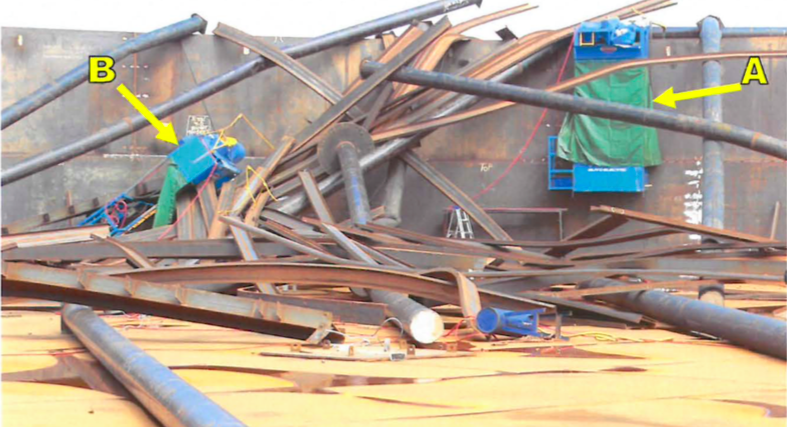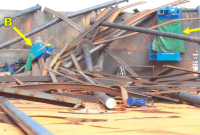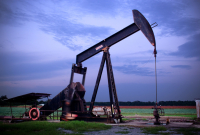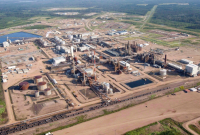Support strong Canadian climate journalism for 2025
Canadian Natural Resources has been fined $10,000 by Alberta’s professional engineering society — the maximum allowed — following an investigation into an accident at an oilsands site that killed two and injured five others in 2007.
In a report released Wednesday, the Association of Professional Engineers and Geoscientists of Alberta (APEGA) says the company has admitted to unprofessional conduct on how it dealt with contract engineers, including supervision at the project site in Alberta nearly 10 years ago.
On April 24, 2007, workers were building a 20-metre high oil tank at the Horizon oilsands project north of Fort McMurray when cables holding up a roof support structure snapped due to high winds. The falling steel structure broke apart, with steel debris striking an electrical consultant, killing him. A scaffolder was crushed and died on the way to the hospital. Two other workers were seriously injured and three others suffered minor injuries.
The two who were killed were foreign workers from China, and among 13 employees trapped by the devastating tank collapse. The engineering association found that the steel cables supporting the roofing structure were inadequate and did not meet regulations.
CNRL guilty of "unprofessional conduct"
"CNRL engaged in unprofessional conduct by failing to ensure that: contractor drawings and procedures were certified by a Professional Engineer as defined by the Engineering and Geoscience Professions Act (and) contractors were competent to perform engineering work," said the report released on Jan. 4. "The contractors CNRL used to construct the tanks were not APEGA Permit Holders. The individual who developed the erection procedure for the tank’s roof-support structure was not a Professional Engineer in Alberta."
In addition to the fine, the association says Canadian Natural Resources will have to pay to help develop a new practice standard on outsourcing engineering and geoscience work in the province, and has agreed to sanctions including participation in a province-wide consultation with APEGA members, and paying up to $150,000 for it.
But the association, which is supposed to ensure safe engineering practices in the province, says it decided not to hold a formal hearing into the disaster because of the time that had passed since the accident occurred and because it concluded that the company had cooperated with the investigation.
Canadian Natural Resources said in a statement that it is looking forward to developing the new standards and that a senior member of its leadership team will actively participate and work together with the association on the initiative. The company also said that it had changed its safety practices following the tragedy and now requires contracting companies to provide evidence of qualifications before engineering work is done.
CNRL taking incident "seriously"
"We take every incident seriously," said company spokeswoman Julie Woo in an email. "Following this incident, CNRL took steps to advance our processes to ensure health and safety standards are consistently met by all contractors."
Last February, Alberta Occupational Health and Safety released the results of its investigation into the accident and concluded that the company did not do enough to ensure that one of its contractors had construction plans certified by a professional engineer. The Chinese engineering firm that Canadian Natural Resources contracted out to pled guilty in 2012 to three workplace safety charges, while 29 charges against Canadian Natural were stayed.
Sinopec Shanghai Engineering Co., the Chinese engineering firm that Canadian Natural Resources contracted out to, pled guilty in 2012 to three workplace safety charges, while 29 charges against Canadian Natural Resources were stayed.
Engineering association spokeswoman Gisela Hippolt-Squair said the association is reviewing provincial legislation for the first time in 30 years and plans to recommend increasing the maximum fine for permit holders to $500,000 per violation.
A discipline committee order that accompanied APEGA's report described the incident in detail and named CNRL's conduct as harmful to the "standing of the profession," and displaying "a lack of knowledge or a lack of skill or judgement."
Editor's Note: This story was updated at 4:20 p.m. Eastern Time to include comments from CNRL.






Comments
Wow! A $10,000 fine for killing two workers, or $5,000 per human life. That'll really stop them in their tracks! It'll probably take the company less time to make that back than it is taking me to write these six sentences. Speaking of sentences, that is, prison sentences for the wrongdoers, perhaps that might be a stronger deterrent? And why not?
$500,000 is nothing and as the maximum would rarely be used. 2 people DIED over this systemic incompetence and absolute flaunting of regulations. Some have even pled Guilty. Fines should start at $50,000 and max out at $5,000,000. Even that isn't much for billion dollar multinationals (especially those owned by other countries), but it would be a stronger deterrent to everyone else ignoring code.
The issue of infrastructure projects designed and built almost entirely by TFW and those outside the country who can't really be held accountable is one that has not been addressed. Given the propitious removal of barriers in the TFW program and the approval of mega pipelines, there have to be regulations and stringent independent oversight to ensure they are followed. The NEB and government agencies are captive to industry and cannot be trusted to look after anyone but their corporate masters.
Welcome, to the incredulous realm of APEGA's self regulation of professional engineers and geoscientists. Although the health and wellness of the public is legislated to be held paramount, it receives little regard whatsoever, and inferior discipline for unprofessional conduct, which took two lives, takes a decade.
Since August of 2014, we have been involved in an investigative and appeal process with APEGA regarding the unprofessional conduct of permit holders and professional members regarding oil and gas operations near our home and in our community. Our investigation, 14-43, was terminated based on a lack of evidence, similar to the CNRL case. This is standard for APEGA. They simply do not make any reasonable effort to collect appropriate evidence, therefore, can cite lack thereof, to terminate an investigation.
Additionally, the investigative panel that reviewed our file, had no oil and gas experience, in drilling, completions or production. Tour reports (drilling logs) were reviewed by a non-professional member, also with zero oil and gas experience. No experience, no evidence, makes for a feeble and ineffective investigation, predetermined to be terminated.
To further, one may notice in the CNRL file, not one professional member is named, just the permit holder. There would have been individual members responsible for the project, why are they not named? Similar in our investigative process, I insisted, numerous times that several individual members and permit holders be investigated, yet, APEGA continually disregarded these communications and only investigated one permit holder, Bellatrix Exploration. The intentional narrowing of a complaint, to insulate professional members under the umbrella of a corporate permit holder, is also a common APEGA tactic.
In over two years of dealing with APEGA, I have been continually taken aback at their regulatory process and lack of professionalism. The public would be most concerned if they knew how little oversight and accountability is afforded to protecting public and environmental interests, as mandated by the EGP Act and APEGA's Code of Ethics. There exists professional members that have engaged in unprofessional conduct and continue to practice, without responsibility or discipline for years and years, unduly risking the health and wellness of the public.
Our file, 14-43 went to appeal in Edmonton on December 16, 2016. Prior to the hearing, I was privy to a discussion, which is explained in the copied correspondence to and from APEGA below, and is a shining example of how APEGA conducts itself.
"Sent: Monday, December 19, 2016 8:46 AM
To: Carol Moen ; John Corriveau
Cc: Colin Ouellette
Subject: DeMontarnal/Thiessen
Good Morning Carol & John,
This is a necessary follow-up to the APEGA appeal hearing for 14-43.
John, you will be aware of this situation, since you were present at the hearing.
Colin, you are cc'd as well, as you bore witness to what is being discussed, during the hearing as well.
Carol, this is critical for you to be informed, as it presents serious concerns regarding the continued reliance of Ms. De Montarnal as a member of APEGA's investigative panels.
I happened to arrive for the hearing on Friday rather early and therefore went to grab a green tea latte and scone at Good Earth cafe. Several minutes later, a gentlemen entered and sat just in front of me, he was soon joined by a lady. After they had their refreshments and were settled, I happened to overhear familiar terms and references of "she", and looked up from my preparations, to see the gentlemen with the 14-43 APEGA appeal agenda in his hand.
From there, they began discussing the appeal, investigative process and myself in earnest, clearly unaware that I was the appellant, and was sitting directly behind them.
Since I have never met anyone, but Frank Boheres, face to face, I was unaware of who these members of APEGA were, or their role in the process. Of course, in short time, I was to learn, the gentlemen was Rick Thiessen and the lady, Karen De Montarnal.
I took notes as they discussed the case and myself. Karen was leading the discussion, with Rick generally providing affirmations.
Karen began by expressing that it was clear that Bellatrix were "no angels" but APEGA simply could not manage every single complaint and it would not be feasible to investigate every complaint either.
Karen questioned the reasoning of this matter going to the Discipline Committee and lamented: "What would they do with this anyway?" and further queried Rick, "They [the discipline committee] wouldn't come back to us, would they?"
They discussed the 28 AER inspections that occurred, as a terminating factor, also as listed in the panel report. (which Karen cited in her sworn testimony in the hearing)
They then went on to converse about the AER health report and issue estoppel, with Rick referencing the report, asking "Would you like to get into this?" At which time, they pull the report up on Karen's laptop and Karen remarks that the report "is over 200 pages long". They decide that she will address that it was written by a Chief Environmental Scientist and as a P.Eng herself, she relies on the work of other professionals. (also cited in sworn testimony)
Finally, there is some mention of me "playing games."
At this point in time, I believe that Ms. De Montarnal may have gotten concerned about my interest in their conversation as we made eye contact numerous times and frankly, it was hard to conceal my astonishment at her behaviour. Karen and Rick then moved on to friendly chitter-chatter, before they left the cafe to proceed to the lower concourse level, to wait outside the conference room.
I joined them about 15 minutes later, and sat in the arm chair next to Rick, at which time we were introduced. When Karen entered, we informally greeted, but there were no introductions.
Upon the commencement of the hearing, I was shocked to learn Ms. De Montarnal was part of the investigative panel for our complaint. Not only did she express disdain for me and the complaint in general, there was no denying the conclusion of a predetermined outcome of the investigation overall.
Claiming a permit holder is "no angel", while insinuating a complainant is "playing games" is not only hard to reconcile but extremely unprofessional, biased and unacceptable, particularly in light of how the investigation was handled from the outset.
To suggest that APEGA is incapable of properly investigating every complaint is also unreasonably dismissive.
From the 2015 APEGA Annual Report:
Complaints against APEGA Members – while small in number relative to the size of our membership – have increased on pace with membership growth. In 2015, 66 complaints were filed, which is up 83 per cent from five years ago, when there were 36 complaints.
To better meet the demand, two new professional investigators were hired in 2015, bringing the total to four.
Not only is the investigative process the mandate and legal obligation of APEGA as a self regulated body, clearly, complaints are minimal and additional staff have been acquired by the organization to deal with these matters.
Regarding the 28 inspections that occurred, it was never mentioned by Karen that there were several deficiencies which resulted in below industry standard compliance levels. I did express that in the appeal hearing. However, this manipulation of factual evidence is disturbing.
To further, the reliance on the AER health report and the affirmations of Dr. Monique Dube, Chief Environmental Scientist is not sound. As mentioned in my appeal letter, the request for an in-person hearing, as well as during the hearing, I point out that the AER report was published with a disclaimer that the report can not be relied upon by anyone. Additionally, Dube is a water toxicologist, not a health professional and has no professional credentials to that would either give her the ability to write such a report, much less have APEGA rely upon that information as issue estoppel, regarding the ability to terminate an investigation with respect to the conduct of professional engineers. The dependence on this report is not only confounding but entirely inexpert and unethical.
I was able to address witnessing the exchange between Karen and Rick in the hearing process, but upon further reflection, I insist the matter be addressed further, at the professional level.
Not only should the process of this investigation face deeper scrutiny, but the continued inclusion of Ms. De Montarnal as a member of APEGA's professional operations must be considered by the organization.
To have a professional member so partisan to permit holders, and condescending of the public, to which they owe a legal duty of care, is reprehensible and shameful. I am sure the panel members could see that on Ms. De Montarnal's face, as I addressed her lack of discretion and objectivity before the panel.
Having been startled witness to such obvious prejudice and preconception, I feel ever more certain the investigative panel erred in their process and decision of termination. I realize that decision is now in the hands of the appeal panel and I can only have optimism, they will uphold the tenets of honest, integrity, fairness and objectivity and ensure this matter is handled appropriately.
However, I think it is prudent that APEGA address the ramifications of having an investigative panel member and management that are so readily contemptuous of their commitment to public safety and well-being.
Just how many investigations has Ms. De Montarnal felt privy to terminate? Most of them? All of them?
Also from the APEGA Annual Report:
"Serving the public interest is our privilege and our responsibility."
It may be time to make certain, that all your members are aware of this honor and duty and if they prove incapable, they are relieved from their role with APEGA.
Regards,
Diana Daunheimer
On 16-12-21 11:51 AM, John Corriveau wrote:
Hello Ms. Daunheimer,
This is to acknowledge receipt of your email, which I assume was copied to me as the result of my involvement with Appeal Board matters and my presence at the appeal. I also confirm that the information in your email formed a part of your submissions to the Appeal Board.
Regards,
John Corriveau, P.Eng.
Director of Regulatory Operations
APEGA
Sent: Thursday, December 22, 2016 7:30 AM
To: John Corriveau
Cc: Carol Moen ; Colin Ouellette
Subject: Re: DeMontarnal/Thiessen
Thanks for your reply and confirmation John.
However, I am looking for greater clarification from APEGA after the revelation, one of their investigative panel members acted in such disreputable manner.
Is this acceptable behaviour?
Will Karen de Montarnal continue to serve as a member of the investigative panels of APEGA, when she exhibits such a unprofessional conduct and disdain for the public?
What further actions do I need to take to ensure this matter is not left at the appeal panel hearing, as it is obvious to me, Ms. de Montarnal did not approach this investigation with objectivity, fairness, integrity or honesty.
How was her sworn testimony during the appeal process fair to me, considering her comments just prior?
Regards,
Diana
Hello Ms. Daunheimer,
At this time APEGA intends to let the appeal process follow its due course, as your concerns were brought up during the appeal and are on the appeal record. The decision by the Appeal Panel is expected by early February 2017. On review of the Appeal Board decision APEGA will decide the appropriate course of action, if any. In the meantime, APEGA will take the opportunity to remind members of its Statutory Boards and Committees of the need to hold APEGA related conversations in and under the appropriate conditions.
Regards,
John Corriveau, P.Eng.
Director of Regulatory Operations
APEGA"
In the end, it seems to me, that APEGA will do nothing more than remind members, that if you are going to have inappropriate conversations, make sure you don't get caught.
I certainly look forward to the appeal decision in February. Meanwhile, there are professional engineers that were involved in this file that continue to authorize and oversee oil and gas operations. Would you want a company that APEGA categorizes as "no angel" operating drilling, hydraulic fracturing and production operations of explosive, sour fossil fuel products by your home?
Don't even need an aspirin for that little slap on the hands.
What a farce. It appears that in the Energy Industry, NO lives matter.
buy hygetropin 200iu
Should you consume wines for its health and fitness benefits you need to stay with red-colored wine beverages. Red wine are packed with herbal antioxidants and are considered to advertise best coronary heart overall health once you consume it sparingly, preferably 1 cup each day. Other wines may possibly have the same advantage in varying degrees, but reddish colored red wine is definitely the best choice.
Bio Peptide Igf 1 Lr3
Care for any constant health problems you have as a way to assistance with increasing your storage. When you may not feel effectively, you may turn out to be frustrated. A stressed out frame of mind negatively influences the way your brain preserves details as your brain will be unable to concentrate. So, handling your physical health is important in boosting your storage.
Ansomone Results
It can be apparent you should not smoke cigarettes or beverage while you are expecting a baby, however it is also good for give up or cut back while you are seeking to get pregnant. Contact with second hand smoke cigarettes and abnormal drinking could cause virility difficulties, in both you and your partner. Additionally it is less difficult on your own physique to cut back on alcoholic beverages progressively, so that it isn't a surprise for your system.
Hgh Australia Prescription